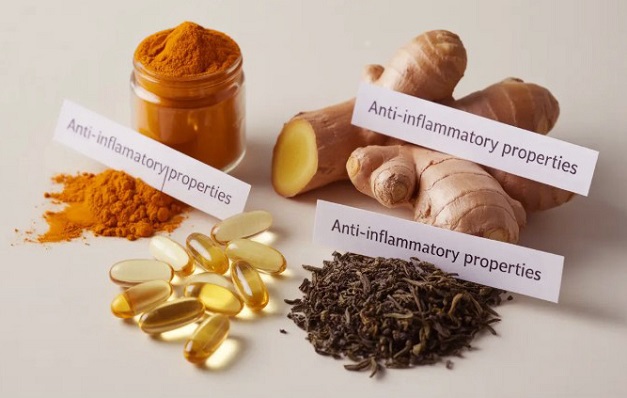Nikhil Prasad Fact checked by:Thailand Medical News Team Nov 10, 2025 3 months, 3 weeks, 6 hours, 22 minutes ago
Medical News: Understanding How Diet Can Protect Against Allergies
A new comprehensive study by researchers from the Faculty of Pharmacy and Nutrition at UCAM Universidad Católica de Murcia in Spain has shed light on how natural nutrients found in everyday foods could help prevent allergies and reduce their severity. Allergic diseases such as asthma, eczema, and food allergies are now among the most common chronic conditions globally, affecting hundreds of millions of people. These conditions happen when the immune system reacts too strongly to harmless substances like pollen, food proteins, or dust. Conventional treatments only ease the symptoms, but they do not fix the root immune problems. This growing gap has led scientists to explore whether food-based bioactive compounds might provide safer and more sustainable ways to restore immune balance and prevent allergic flare-ups. According to this
Medical News report, the Spanish researchers examined dozens of studies on six well-known dietary compounds: omega-3 fatty acids, vitamin D, curcumin (from turmeric), ginger extracts, quercetin (a flavonoid found in apples and onions), and epigallocatechin gallate (EGCG) from green tea.
 Natural Nutrients Show Promise in Preventing Allergies
The Nutrients and How They Work
Natural Nutrients Show Promise in Preventing Allergies
The Nutrients and How They Work
The study found that these natural compounds share a common ability to calm inflammation and rebalance immune responses. Omega-3 fatty acids from fish oils or algae help lower the overactive Th2 immune response often seen in allergies and promote the growth of protective T-regulatory cells. Vitamin D strengthens the body’s immune tolerance and helps maintain the protective barriers of the skin, lungs, and intestines—important for blocking allergens from entering the body. Curcumin from turmeric was shown to block major inflammation pathways such as NF-κB and MAPK, and to improve the integrity of skin and mucosal barriers. Ginger’s active compounds, [6]-gingerol and [6]-shogaol, reduce mast-cell activation and balance the body’s immune signals, while quercetin stabilizes mast cells and prevents histamine release, bringing relief in allergic rhinitis. EGCG from green tea can calm airway inflammation and block allergic responses at the cellular level. Together, these bioactives were found to influence key immune signaling pathways, including NF-κB, MAPK, and PI3K-AKT, which are responsible for driving allergic inflammation.
What the Research Shows in People and Animals
In laboratory and animal studies, these nutrients consistently reduced allergy markers, lowered levels of inflammatory cytokines such as IL-4 and IL-5, and improved tissue health. Clinical studies in humans showed mixed but promising results. For example, omega-3 supplementation during pregnancy and early childhood modestly reduced eczema and food sensitization in children. Vitamin D supplements helped people with eczema and allergic rhinitis, especially those deficient in it. Curcumin improved nasal symptoms in people with chronic allergic rhinitis and reduced skin inflammation in mild eczema. Ginger and quercetin both helped ease nasal allergy symptoms in small studies, w
hile EGCG showed benefits mainly in preclinical trials. Importantly, all compounds appeared safe at moderate doses, although their effectiveness depended on formulation and absorption.
The Broader Impact and Future Outlook
The researchers concluded that while clinical results are still inconsistent, the biological evidence is strong enough to justify further long-term studies and standardized supplement formulations. They emphasized that these bioactive compounds could become part of a future “food as medicine” approach to allergy prevention, particularly in children and high-risk groups. These findings offer hope for millions of people suffering from allergies, pointing toward natural, accessible options that complement traditional therapies. The authors also noted that early-life nutrition could be a key period for preventing the immune system from becoming hypersensitive to allergens. Overall, the study supports the idea that small daily choices—such as consuming oily fish, sunlight exposure, or spices like turmeric and ginger—may have long-term protective effects against allergic conditions.
Conclusion
The study underscores the growing importance of nutrition in managing and possibly preventing allergic diseases. While more research is needed to confirm exact doses and combinations, these findings highlight the potential of natural food-based compounds to reduce allergic inflammation safely and effectively. This approach may lead to a new era of preventive medicine based on dietary bioactives that restore immune balance instead of merely treating symptoms.
The study findings were published in the peer reviewed journal: Nutrients.
https://www.mdpi.com/2072-6643/17/22/3506
For the latest on treating or preventing allergies, keep on logging to Thailand
Medical News.
Read Also:
https://www.thailandmedical.news/articles/health-news
